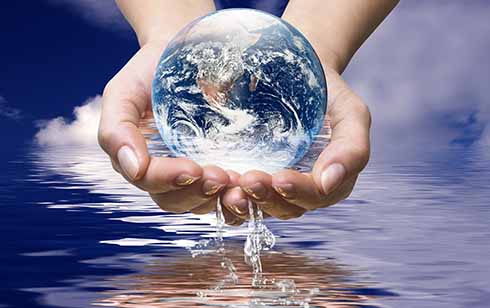 In Australia last month we saw the delicate balance between too much and too little water.
In Australia last month we saw the delicate balance between too much and too little water.
In Townsville and surrounding country incessant rain flooded houses, killed cattle and devastated people’s lives. Further south in the Menindee Lakes drought and water mismanagement killed many thousands of fish.
Droughts and floods are events of nature beyond our control. They reflect the subtle relationships between natural forces: temperature, atmospheric conditions, winds and currents. But they also reflect the relationships between human beings and the way they shape human relationships with the natural world. Human decisions to draw water from the river system to irrigate profitable crops can affect life downstream. Human induced global warming can increase the likelihood and destructiveness both of drought in some areas and of hurricanes in others.
NATURAL CYCLES
For water we rely on reliable natural cycles of evaporation, precipitation, draining. Ordinarily we build our human lives and societies around the availability of water. Our human cycles cross the natural cycles. We gather in settlements around water, store it for later use, use it to grow food and for industrial processes. To sustain our lives we need to respect the natural cycles: to protect the conditions under which rain will fall, rivers will flow and forests will grow from the source of streams to river mouth.
If that is to happen relationships between different groups in society need also to be justly ordered. People at the head of rivers need to measure their use of water to the needs of those at the mouth. Industries must be curbed from polluting water sources.
TAKE RESPONSIBILITY
As we celebrate World Water Day on 22 March, it is essential both industries and agriculture take responsibility for reducing the emissions that affect global warming. Our future depends on respect for the environment of which we are part.
We know now that when relationships between people are competitive and our relationships with the natural world are exploitative the result is pollution and an increase in global warming. Respect demands cooperation at every level in protecting the needs and resilience of the environment. This inevitably involves a cost: industries and crops offering short-term profits may have to be sacrificed in the interests of a sustainable world.
RESPECT FOR EACH OTHER
Without respect for one another and for the environment of which we are part, people who are the most vulnerable and lacking in resources inevitably suffer most. They must drink and bathe in polluted streams, lack sanitation, go thirsty in places of extreme temperature, and live at the edge of rising seas. Their lives and health are under constant threat.
Social justice demands respect for the environment as well as for human beings. Respect cannot be divided and must begin at the smallest level. The Catholic tradition supports this in its association of the simple things of the world with God’s care for us – water for baptism and bread for the Eucharist. Water is necessary for life and for business. It is not simply to be used but to wondered at and treasured.